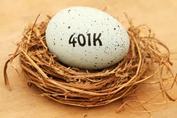
After joining a company, many people think they are not at the company long enough to qualify for 401(k). They end up delaying a few years then enroll. The problem is they've lost out on matching contributions (assuming their employer matches) and on the tax-deferred gains on funds they could have saved and invested. Changing jobs five to seven times over a working career (which is typical) only compounds this mistake.
2) Not increasing contributions
Study shows the average contribution percentage for workers saving in a 401(k) is around 6 percent. Most studies indicate that workers without a pension will need to save and invest 10 percent or more every year into a 401(k) type retirement plan. These assets combined with Social Security income should be sufficient for retirement. If you enrolled into your 401(k) with a six percent contribution percentage, increase this to at least 10 percent as soon as possible and work towards increasing it from there over time.
3) Not making catch-up contributions
If you are celebrating your 50th birthday this year (or a birthday over age 50), then you have some catching up to do - you can make additional contributions all year into certain tax advantaged savings plans and accounts. If your savings could use a boost, and you're 50 or older, then you'll want to take advantage of these opportunities.
In 2013 workers can contribute up to $17,500 annually into their employer sponsored 401(k) type retirement plans. But if you're over 50 at any time in 2013 (even if you turn 50 on December 31st 2013), you can contribute an additional $5,500 (which remains unchanged from 2012 limits) for a total contribution of $23,000.
4) Taking a 401(k) loan
Most retirement plan experts agree you should never take money from your 401(k) plan because you are taking money away from what you will need for a financially secure retirement. The biggest risk of borrowing from your 401(k) is that most plan rules require repayment within 30 to 90 days of leaving your employer. That's a disaster for someone who suddenly loses their job. If you don't have the money to pay off the loan it will be included in income as a taxable distribution. If you are under the age of 59 1/2 you'll owe a 10% penalty tax on top of applicable federal and state income taxes. If you don't have the money to pay the tax, the IRS can collect what you owe by deducting it from your remaining balance, virtually wiping out your retirement savings in the plan. Whether or not it's a good idea to take a withdrawal from your 401(k) account ultimately depends on what you are doing with the money, but for the reasons explained here, it's wise to avoid this move, as it can backfire.
5) Not running your retirement numbers
The time to find out you have not saved enough is not after you retire. Now is the time to do some serious number crunching. Calculating how much income your current retirement account and annual savings will generate at retirement is a critical step to ensuring you are on track to achieving your retirement income goals. If your retirement plan offers access to online tools to do this, use them.

 RSS Feed
RSS Feed
